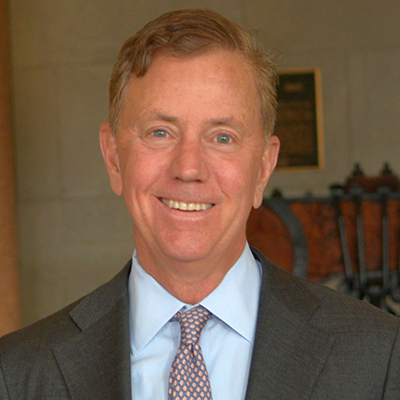
Governor Dannel P. Malloy established the Business Tax Policy Review Task Force through Executive Order No. 17 (January 12, 2012).
Scope of the Task Force: The Governor’s Executive Order specifies the following scope of work for the Taskforce:
Identify specific areas of business taxation and other issues, including tax credits and other tax benefits, that should be the focus of future legislation and state economic policy.
Evaluate the cost, benefit, efficiency, effectiveness and measurable performance of the current business tax credit structure with respect to economic development, business retention and growth, and employment and growth.
Report findings and recommendations to the Governor by October 1, 2012.
The Governor's Certificate of Need Taskforce is responsible for comprehensively reviewing Connecticut’s laws regulating the ability of hospitals, nursing homes, residential care homes, certain physician groups, and other health care entities to establish new facilities or provide new services, change ownership, purchase or acquire equipment, make capital improvements, and terminate services. The review is intended to ensure that consumers in Connecticut continue to receive equitable and affordable access to high quality health care that encourages transparency and competition, contributes to economic development, and promotes community benefits.
The Educators' Common Core Implementation Taskforce, created by Governor Malloy, is a 25-member group comprised of teachers, education professionals and parents that is tasked with identifying challenges and gaps in Common Core preparation, and making recommendations on improving the quality and consistency of its implementation.
Members
Dennis Murphy (Chair): Deputy Commissioner, Connecticut Department of Labor
Dorothelia Barnett: Owner and Operator, Totts Inn Daycare and Learning Center
Harriet Feldlaufer: Bureau Chief, State Department of Education
Larry Fox: Consultant
Phyllis Hyman: Legislative and Administrative Manager, Connecticut Department of Social Services
Jane Norgren: Social Worker and Guardian, Guardianship for Retarded Persons
Peter Palermino: Program Manager, Connecticut Department of Social Services
Jessica Sager: Co-Founder and Executive Director, All Our Kin
Teresa Younger: Executive Director, Permanent Commission on the Status of Women
The Intellectual and Developmental Disabilities Working Group is a 17-member panel created by Governor Malloy to examine and improve the provision of services to members of the intellectual and developmental disabilities community.
In April of 2012, Governor Dannel P. Malloy appointed the members of a working group to analyze and make recommendations on how the state can modernize its approach to recycling, reduce waste through improved materials management and lower costs for municipalities, residents, and businesses. The working group has established subcommittees to address these tasks. A final report outlining their recommendations is due on December 1, 2012. The working group is being led by the Governor's Office in partnership with the Department of Energy and Environmental Protection and other state agencies. For more information, please contact DEEP.CTRecycleWG@ct.gov.
The Rocky Hill Veterans' Home Working Group is a panel created by Governor Malloy to plan and determine the best state programs and the most effective use of the Department of Veterans' Affairs Rocky Hill Campus in order to support Connecticut’s veteran's population.
The Sandy Hook Advisory Commission is a 16-member panel of experts created by Governor Malloy to review current policy and make specific recommendations in the areas of public safety, with particular attention paid to school safety, mental health, and gun violence prevention.
The SB 410 Workgroup is a panel created by Governor Malloy in response to Senate Bill 410, An Act Concerning Administrative Hearings Conducted by the Department of Social Services, which the Governor vetoed on June 12, 2014. In vetoing the legislation, the Governor ordered the creation of a group to "examine thoroughly the DSS hearings process" and report their findings back to him.
The Governor's Sexual Assault Kit Working Group is responsible for examining and limiting barriers for submitting sexual assault evidence to the Connecticut Forensic Science Laboratory. With the goal of helping local and state law enforcement work hand-in-hand, the working group will make recommendations to standardize and facilitate the transfer, tracking, and testing of evidence kits as well as address issues around victim notification.
The Governor's Transportation Finance Panel is a group of experts in transportation, finance, and economic development charged with examining funding options and developing recommendations that will make Governor Malloy's 30-year, $100 billion vision to modernize Connecticut's transportation infrastructure a reality. This panel will develop revenue and finance options that will fund this vision in the most prudent and cost-effective way possible in order to create a best-in-class transportation system for the state.
The Governor's Youth and Urban Violence Commission, created by Governor Dannel P. Malloy and Lt. Governor Nancy Wyman, is a panel of experts and community leaders from a variety of backgrounds charged with reviewing the sources and causes of youth violence in urban areas, as well as developing proposals that will further reduce the rate of violent crime. The Commission is responsible for identifying risk factors that result in the incidence of violence in high-crime communities and recommending meaningful policies and evidence-based programs designed to reduce violence. Specifically, it is focusing on violence prevention, and reducing or eliminating the risk factors of youth violence through the implementation of statewide, interagency policies.